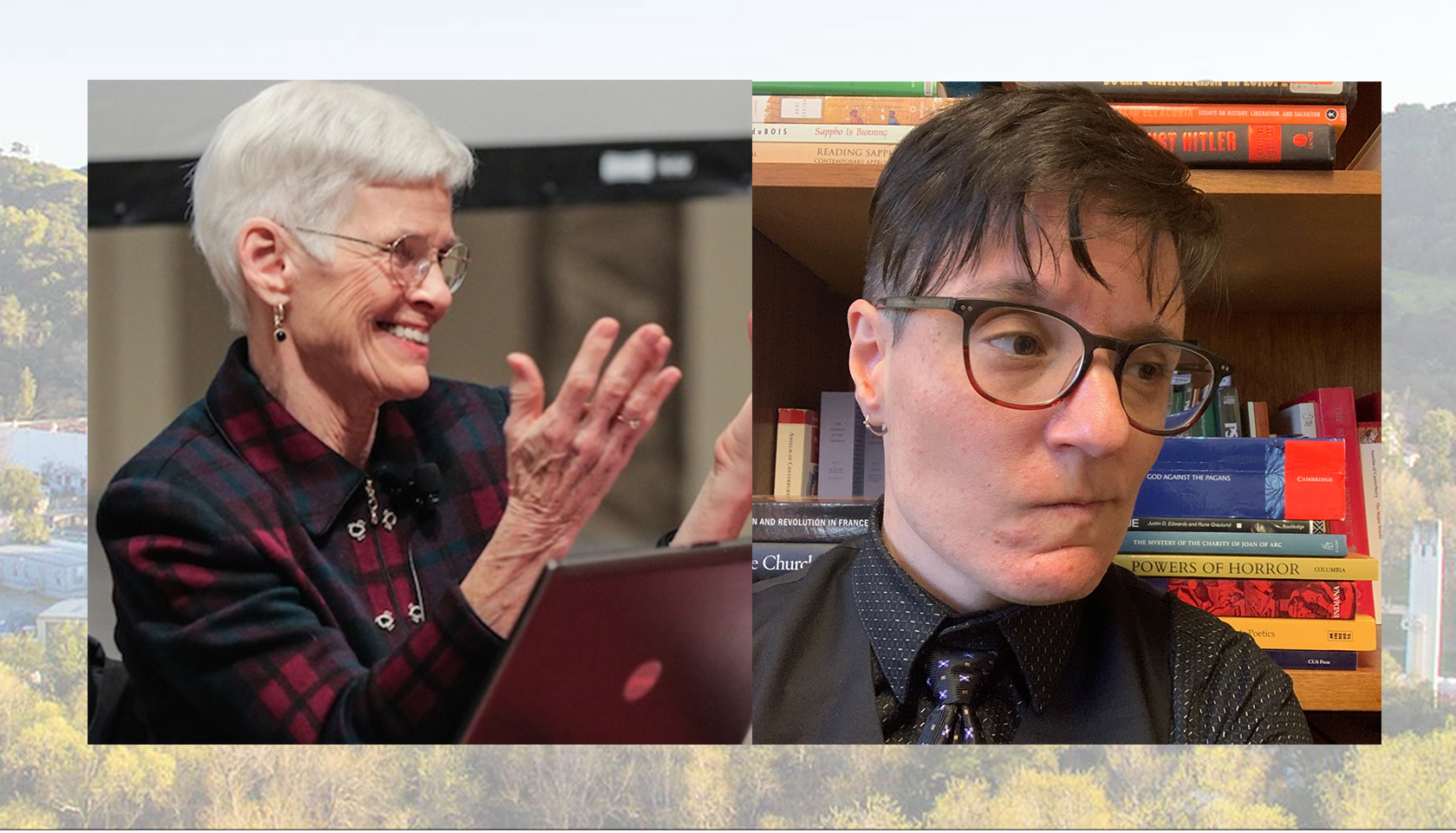
Spring lectures for the Cummins Institute: from left, Judy Mayotte and Anne Carpenter / Photos courtesy Judy Mayotte and Anne Carpenter
Ecology and Anxiety: Two Upcoming Cummins Institute Lecturers Speak to Our Current Moment
Longtime journalist and humanitarian Judith Mayotte is this year's Montini Fellow. Anne Carpenter, who taught for a decade at SMC, is the Cummins Lecturer in Theological Exploration.
When the Cummins Institute for Catholic Thought, Culture, and Action was established in 2001, it was out of a desire to foster dialogue between the Catholic tradition and contemporary intellectual life. In the coming weeks, the Institute will sponsor two lecturers who exemplify that core mission: 2024 Montini Fellow Judith Mayotte and 2024 Cummins Lecturer in Theological Explorations Anne Carpenter.
Integral Ecology, Refugees, and Laudato Si
On April 11, 2024, the Saint Mary's community will welcome Judith Mayotte as this year’s Montini Fellow. Created in 2008 by the Cummins Institute, the Montini Fellowship spotlights individuals who have contributed significantly to Catholic higher education and the Catholic intellectual tradition.
Mayotte’s will lecture on integral ecology, a concept rooted in Pope Francis' second encyclical, Laudato Si. Integral ecology is unique, says Brother Charles Hilken, FSC, in its “understanding of how the degradation of the earth affects those most vulnerable.” Brother Charles, who directs the Cummins Institute, believes no one is better equipped to discuss this topic. “Dr. Mayotte can give voice from experience to Pope Francis’ Laudato Si, which states that stewardship of the earth is critical for the saving of marginalized humanity.”

The seeds of this Montini Lecture by Mayotte were planted in 1989, following three decades of work by her as an Emmy and Peabody award-winning broadcast journalist. After receiving a competitive MacArthur Foundation grant to write about refugees, Mayotte spent the next two years traveling through Southeast Asia and the Middle East, reporting what would eventually become the book Disposable People? The Plight of Refugees, published in 1992.
So began her second act—one devoted to humanitarianism, ethics, and, above all, the displaced. Mayotte went on to serve as a special adviser on refugee issues and policy under President Bill Clinton, teach at Marquette University and Seattle University, and work annually with Archbishop Desmond Tutu in South Africa. Tutu has described her as “a wonderful advertisement for God and goodness.”
Christianity and Anxiety

Anne Carpenter’s name should be familiar to Gaels. From 2013 to 2023, she was an associate professor in Saint Mary’s Department of Theology and Religious Studies. She recently took an academic post with St. Louis University, where she is now the Danforth Chair of Religious Studies.
On March 19, Carpenter will give a talk entitled “The Christian and Anxiety: On Christianity, Prayer, and Asking Questions.” Like Mayotte’s lecture, the subject matter is incredibly “urgent,” Brother Charles says. “If the degradations of the world and the human community in peril cause you anxiety, then come and listen to Carpenter.”
As a scholar, Carpenter has grappled with Catholic tradition’s place in our current age, whether you think of this era as metamodern or post-postmodern. Her most recent book, Nothing Gained Is Eternal: A Theology of Tradition, draws on the thoughts of 20th-century thinkers like Bernard Lonergan and Hans Urs von Balthasar while wrestling with tradition in light of the Church’s colonialist practices. “If ‘tradition’ and ‘liberation’ are often considered the possessions of opposing theological camps, in Carpenter’s hands they cannot be separated,” writes theologian Kevin L. Hughes in his review.
Brother Charles, who has been friends with Carpenter for a decade, concurs. “She is the most orthodox Catholic theologian I have ever met, from the standpoint of knowing that charity is the root of all theology.”
LEARN MORE about the Cummins Institute.